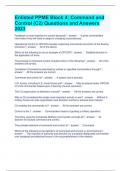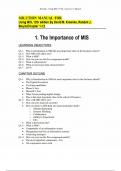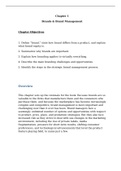Performance Concepts and Performance Theory
- Relevance of individual performance
o Individual performance is a key variable in work and organizational psychology
o Individual performance is mainly treated as a dependent variable something
organizations want to enhance and optimize
- Definition of performance
o When conceptualizing performance one has to differentiate between an action
(behavioral) aspect and an outcome aspect of performance
Behavioral aspect refers to what an individual does in the work
situation
Not every behavior is subsumed under the performance concept, but
only behavior which is relevant for the organizational goals
Performance is not defined by the action itself but by
judgmental and evaluative processes
Only actions which can be scaled (measured) are considered to
constitute performance
o The outcome aspect refers to the consequence or result of the individual’s
behavior
Outcome aspects of performance depend also on factors other than
the individual’s behavior
o In practice, it might be difficult to describe the action aspect of performance
without any reference to the outcome aspect
o Because not any action but only actions relevant for organizational goals
constitute performance, one needs criteria for evaluating the degree to which
an individual’s performance meets the organizational goals
Difficult to imagine how to conceptualize such criteria without
simultaneously considering the outcome aspect of performance at the
same time
- Performance as a multi-dimensional concept
o Performance is a multi-dimensional concept
Distinguish between task and contextual performance
Task performance individual’s proficiency with which he or
she performs activities which contribute to the organization’s
‘technical core’
Contextual performance activities which do not contribute to
the technical core but which support the organizational, social,
and psychological environment in which organizational goals
are pursued
3 assumptions associated with the differentiation between task and
contextual performance
Activities relevant for task performance vary between jobs
whereas contextual performance activities are relatively similar
across jobs
Task performance is related to ability, whereas contextual
performance is related to personality and motivation
, Task performance is more prescribed and constitutes in-role
behavior, whereas contextual performance is more
discretionary and extra-role
Task performance
5 factors refer to task performance
o Job-specific task proficiency
o Non-job-specific task proficiency
o Written and oral communication proficiency
o Supervision
o Management/administration
Contextual performance
2 types of contextual performance
o Behaviors which aim primarily at the smooth
functioning of the organization as it is
o Proactive behaviors which aim at changing and
improving work procedures and organizational
processes
Contexual performance is not a single set of uniform behaviors,
but is in itself a multidimensional concept
o Relationship between task and contextual performance
Task and contextual performance can be easily distinguished
Contextual performance is predicted by other individual variables than
is task performance
Abilities and skills tend to predict task performance
Personality and related factors tend to predict contextual
performance
- Performance as a dynamic concept
o Individual performance is not stable over time
o Variability in an individual’s performance over time reflects learning
processes and other long-term changes and temporary changes in
performance
o Performance initially increases with increasing time spent in a specific job and
later reaches a plateau
o The processes underlying performance change over time
During early phases of skill acquisition performance relies largely on
‘controlled processing’, the availability of declarative knowledge and
the optimal allocation of limited attentional resources
Later in the skill acquisition process performance relies on
automatic processing, procedural knowledge, and psychomotor
abilities
o Processes underlying changes of job performance
There are 2 stages transition and a maintenance stage
Transition stage occurs when individuals are new in a job
and when the tasks are novel
o Cognitive ability is highly relevant
Maintenance stage occurs when the knowledge and skills
needed to perform the job are learned and when task
accomplishment becomes automatic
, o Cognitive ability becomes less important and other
dispositional factors (motivation, interests, values)
increase in relevance
Individuals differ with respect to patterns of intra-individual change
there is no uniform pattern of performance development over time
o There is short-term variability in performance due to changes in an individual’s
psycho-physiological state ex. processing capacity
These states do not necessarily result in a performance decrease
- Perspectives on performance
o Individual differences perspective searches for individual characteristics
(general mental ability, personality) as sources for variation in performance
o Situational perspective focuses on situational aspects as facilitators and
impediments for performance
o Performance regulation perspective describes the performance process
o Motivation is essential for performance
Motivational constructs related to performance can be partly
subsumed under the individual differences perspectives (need for
achievement), partly under the situational perspectives (extrinsic
rewards), and partly under the performance regulation perspective
(goal setting)
o Individual differences perspective
Focuses on performance differences between individuals and seeks to
identify the underlying factors
Core question Which individuals perform best?
Differences in performance between individuals can be explained by
individual differences in abilities, personality and/or motivation
General model of individual differences in performance by Campbell
Differentiates performance components (ex. job-specific task
proficiency), determinants of job performance components and
predictors of these determinants
o Performance components as a function of three
determinants
, Declarative knowledge, procedural knowledge
and skills, and motivation
o Predictors of the determinants are abilities,
personality, interests, education, training, experience,
etc.
o Motivation comprises choice to perform, level of
effort, and persistence of effort
Campbell neglects situational variables as predictors of
performance
Ability and experience were predictors of job knowledge and
job skills, but had no direct effect on job performance
Another model built on the ideas of Campbell however they stated
that personality variables have an effect on contextual knowledge,
contextual skill, contextual habits and, additionally, task habits
Task performance is predominantly a function of cognitive ability and
contextual performance is predominantly a function of personality
However cognitive ability has a minor effect on contextual
performance (mediated by contextual knowledge) and
personality has a minor effect on task performance (mediated
by task habits)
In general this perspective addresses cognitive ability, personality,
motivational factors, and experience as predictors of job performance
Strong relationship between cognitive ability and job performance
General relationships between personality factors and job performance
are relatively small the strongest relationships emerged for
neuroticism/emotional stability and conscientiousness
Motivational skills refer to self-regulatory strategies pursued during
goal striving
They are more domain-specific and influenced by situational
factors
Self-efficacy has been shown to be related to task performance, and to
contextual performance
This perspective suggests a focus on personnel selection For
ensuring high individual performance, organizations need to select
individuals on the basis of their abilities, experiences, and personality
o Situational perspective
The situational perspective refers to factors in the individuals’
environment which stimulate and support or hinder performance
Core question to be answered In which situations do individuals
perform best?
Encompasses approaches which focus on workplace factors but also
specific motivational approaches
Focus on workplace factors as major situational predictors of individual
performance
2 major approaches
o Situational factors which enhance and facilitate
performance
Job characteristics model







